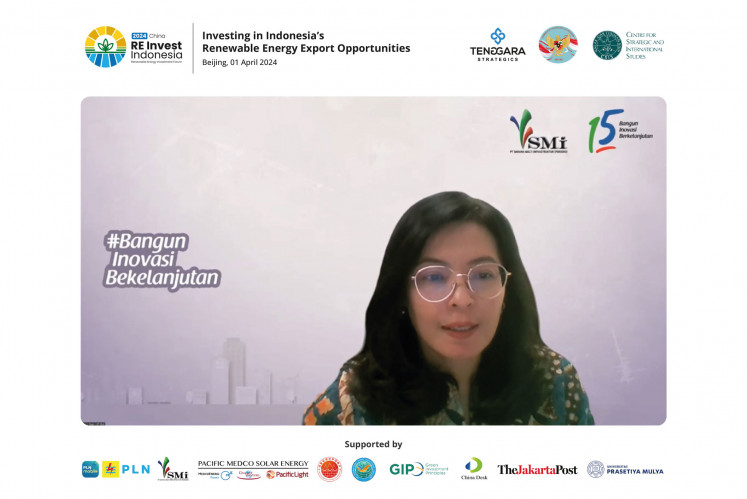RSPO works to protect the rights of children and women to safeguard their wellbeing
Change Size
 (Courtesy of Roundtable on Sustainable Palm Oil (RSPO))
(Courtesy of Roundtable on Sustainable Palm Oil (RSPO))
E
nsuring that children and women in agriculture can exercise their rights is crucial as this will pave the way for their future development and wellbeing.
Universally acknowledged children’s rights include the right to health, education, play and recreation; and to be protected from abuse and harm. Meanwhile, the right to live free from violence and discrimination, to be educated, to own property, and to earn a fair and equal wage are among the women’s rights enshrined in the United Nations.
How is the current situation regarding the rights of children and women in the labor-intensive palm oil industry in Indonesia?
Experts have found that the denial of children’s and women’s rights in the palm oil working environments is a critical issue that needs to be urgently and globally addressed.
Roundtable Sustainable Palm Oil (RSPO) says that the absence of specific legislation or guidance regarding the protection of women’s and children rights in the palm oil industry has put women at a disadvantage.
“This often creates an unsupported working environment and limits their ability to contribute to the income of the family in a meaningful way,” says RSPO’s Senior Manager of Global Community Outreach and Engagement, Imam A. El Marzuq.
Though women have contributed significantly to the work and operations of oil palm plantations, employment has long been male-dominated due to gender inequality issues.
“This lack of employment might stem from traditional gender norms and the lack of a balanced view,” he says.
According to him, a lack of maternity protection, childcare and breastfeeding support, poor health and nutrition levels, no formal employee status, nor limited access to employee benefits, a lack of job security and limited access to basic services in remote areas are among the common issues found in the industry.
The issues affect millions of workers and their families engaged in oil palm cultivation.
“The aforementioned working conditions put women in a vulnerable position in terms of their capacity to earn, and their own and their family’s health,” he says.
“For example, women who don’t have access to maternity benefits may be forced to return to work as early as one month after delivery and in work that involves dealing with chemicals, putting both mother and baby at further risk.”
According to the United Nations Children’s Fund (UNICEF) research in 2016, an estimated 5 million children could be affected by the palm oil sector in Indonesia as dependents of workers. This does not include children working in the industry and living in rural communities near oil palm plantations who are also impacted by the sector.
In 2017, the Center for International Forestry Research (CIFOR) estimated in its report that in Indonesia, roughly 1.5 million women work in the oil palm sector, either as plantation workers on large plantations or in the households of small-scale producers.
With many women and children working in the palm oil industry, concrete steps to enable children and women to exercise their rights should be taken because otherwise, their future development and wellbeing are at stake.
This explains why the RSPO is committed to protecting the rights of children and women in the palm oil industry.
“The protection of women and child rights is, and always has been, a fundamental value and requirement of RSPO members,” says Imam.
According to him, children and women, under the impact goal “People” in the RSPO Theory of Change, are considered important stakeholder groups that can be affected by the operations of oil palm plantations.
He says that to achieve the RSPO objective of making sustainable palm oil the norm and to ensure that sustainability principles are upheld, the impact from the activities of RSPO members should be identified and managed, and whereby any negative impacts should be mitigated accordingly.
“The oil palm plantation operations of RSPO members can contribute to the wellbeing of the affected stakeholders, including children and women,” he says.
He explains further that through the 2018 Principles and Criteria (P&C), RSPO ensures that adequate protection to the rights of workers (and their families) on plantations are in line with international and local standards, including the International Labour Organization (ILO), the Sustainable Development Goals (SDG) principles, the United Nations (UN) Guiding Principles on Business and Human Rights (2011).
He reveals that in November 2018, RSPO adopted a revised certification standard for the production of sustainable palm oil under Principles and Criteria (P&C).
He says that the new standard contains a number of important improvements regarding the protection of children.
“Among other requirements, the new P&C mandate RSPO members to adopt a formal child protection policy, implement monitoring processes and train staff to ensure children in plantations are safe from harm and any form of exploitation.”
The P&C also contain stricter requirements for the handling of pesticides to prevent the harm they may cause to workers, communities and children.
Gender committee
Meanwhile, RSPO Indonesia Assurance Manager Djaka Riksanto says that on the issue of women’s rights, the previous version of the standard already included gender-equality in some requirements relating to women.
“Criterion 6.1.5 of the RSPO 2018 P&C specifically mentions the importance of the establishment of a gender committee to raise awareness, identify and address issues of concern, as well as opportunities and improvements for women,” he says.
According to him, RSPO P&C guidance on the particular requirement further elaborates on this matter, stating that a gender committee that specifically deals with women's issues is required to meet these criteria.
This committee should consist of female and male worker representatives from all aspects of work who consider issues such as training for women's rights, counselling for women involved in violence cases and handling other issues of concern, Djaka says.
On top of that, he says, RSPO has also developed a series of child rights guidance documents for different stakeholder groups.
The documents are a result of a memorandum of understanding between RSPO and UNICEF concerning the impact of the palm oil industry on children.
“The intention of RSPO’s guidance documents is very clear. We hope children can grow up in an environment where they can reach their full potential, despite their circumstances. The guidance documents aim to help our members to see how they can address the impact areas and work together with their workers and the communities around their plantations to mitigate the impact of the industry on children,” he says.
For certification processes, according to Djaka, training on the implementation of the standards has been conducted with auditors to ensure social issues are properly audited in the enhanced RSPO standards.
RSPO members are expected to have a strategy to contribute to increased gender equality within the company as this is part and parcel of the sustainability standard of RSPO, according to Djaka.
Djaka says that RSPO expects to release the guidance specific to addressing the gender-based constraints of women in the whole palm oil sector and contributing to greater gender equality in the near future.









